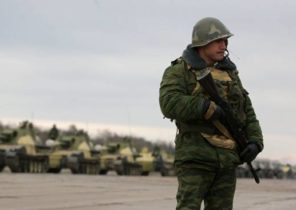
In Tokyo, completed the Russian-Japanese consultations of foreign Ministers and defence Ministers, the first such meeting in 2013. Actually, then, four years ago, the format of “2+2” was created, so that this meeting — only the second in history. After the annexation of the Crimea Japanese side refused consultations on the withdrawal of sanctions against Russia, and this position remained unchanged until the end of last year. The decision to hold the meeting of Ministers was one of the results of the December meeting of the leaders of the two powers — the Japanese Prime Minister Abe Shinzo (Mushrambo Abe) and Russian President Vladimir Putin.
Reboot
The Ministerial meeting was the most important but not the only event long Russo-Japanese weekend — on Saturday started consultations on the high level, the main purpose of which was to discuss cross-border cooperation, including economic. Even the first Ministers met separately, each with his colleague, which allowed us to discuss some practical matters of political and military cooperation. Agreed Abe’s visit to Russia in April is not an isolated case, and immature tendencies. Members of the Japanese Cabinet in the past six months not just a lot and often meet with their Russian colleagues. Their contacts are organized in order to “synchronise watches” as it recently did the foreign Ministers of Britain Boris Johnson (Boris Johnson) and Germany, Sigmar Gabriel (Sigmar Gabriel). The goal of the top Japanese negotiators are quite practical, and therefore all the more reason is to talk about the full restart of bilateral cooperation.
Of course, the need for constructive dialogue is long overdue, and that further delay from the point of view of Japanese interests, is harmful. After all, in a circle most important for Tokyo to the issues raised during the consultation — North Korean nuclear and missile tests, confidence-building measures in East Asia, transport and energy cooperation in the region, the reform of the UN, finally, the conclusion of a peace Treaty and resolving the territorial problems, concerted actions of Russia and Japan necessary for success. But the question remains — why is Abe, which is a consistent and faithful supporter of the military and political Union with the United States, moreover, has made in recent years to strengthen this Union, so obviously departs from the common political line of the “Big seven” and the whole global West? Does Tokyo exit anti-Russian sanctions?
In Japan, Abe to meet Russia does not enjoy absolute support. For these steps it is actively criticize the opposition, and fellow liberal democratic party. After the December summit in the Japanese media with eloquent frequently comments — mostly anonymous — the senior staff of the Ministry of foreign Affairs and other government agencies, which indicate the immutability of the foreign policy, the rejection of the annexation of the Crimea and the destructive condemnation of Russia’s actions in Eastern Ukraine, and even the right expressed perplexity about the excessively warm contacts with Prime Minister Putin. Even before the beginning of bilateral meetings in the official comments of the Japanese foreign Ministry once again was told about “inadmissibility of forceful change of the status quo” in international Affairs.
But if you look at these comments more closely, it becomes clear that justify their position of criticism Abe is not a principled position, based on the unity of Western values, and the desire to further strengthen the relationship with Washington to further tie the Japanese and American interests. And the sanctity of this bunch are interested in the most Japanese statesmen and diplomats only in the context of evolving regional situation in East Asia. In this context, revealing the final press-conference, completing the consultations in the format “2+2”. And the performances of the four Ministers, and, in fact, the Protocol questions of the representatives of the Japanese and Russian press focused exclusively on the far Eastern problems. And if the lack of the Ukrainian question can still be explained by the reluctance of the hosts to upset the Russian guests, regarding the Middle East, traditionally important for Tokyo, or Central Asia, which formally continues to be one of foreign policy priorities of Japan, this explanation will do nothing. Japanese foreign Minister Fumio Kishida (Fumio Kishida) only mentioned in passing Syrian and Ukrainian conflicts, combining them in one sentence.
Global or regional status of the victory?
And this reflects the existing rift between the position of the Abe and views of the majority of today’s leading politicians of Japan. Abe remains a follower of the traditions established in the days of climbing in the early 1970s, the Japanese political Olympus of Kakua Tanaka (Kakuei Tanaka), even if he remained Prime Minister for only two years, stepping down under pressure from a corruption scandal, but one and a half decades has remained the most powerful figure in Japanese politics. Japan in those years — a successful, rapidly growing economy, which opened the possibility to convert earned financial capital to the political capital. For several decades the purpose of the Japanese establishment was the movement to the status of a global power, the role of one of the world leaders. In this way, Japan has faced many problems, part is insoluble, but one after the other premiers, Ministers and influential politicians made new steps towards the goal.
But since the 1990s, this path became every time more difficult, economic crises undermined the financial strength of Tokyo, and a changing global political landscape demanded repeatedly to be distracted by the current, more acute challenges. In the end, the end of the first decade of our century rethinking of the mission in Tokyo in the world has led to an increasingly clear departure from the global challenges in favor of the interests of regional, strongly connected with Japan to the East and South-East Asia. With the fall of the first Abe Cabinet in 2007 a series of quick, successive cabinets have increasingly shifted the foreign policy agenda of Tokyo in the direction of the regional. This has contributed to the shift in global trade towards Asia, and the rise of China (and hence Chinese threat). The return of Abe to power seems to have returned and the global agenda — in Economics, international politics, defense issues. But over the past between the two Premiership five years, in fact, has formed a new paradigm of Japanese politics, where Japan absorbed more regional problems and interests.
Today Abe looks almost the last advocate of the global status of Japan. Even in his entourage often sounds the idea is to convert global role in regional victory, using it as a base for further agreement with the opponents and allies. And the dialogue with Moscow turns to the Japanese Prime Minister to check the consistency of his agenda in foreign policy. In relations with Russia remains a lot of issues that go far beyond regional boundaries. Striking contrast with the meetings of Ministers of the December summit, Abe and Putin embraced a truly global agenda — in addition to the usual questions, there was Afghanistan and South Asia, aid to Africa and migration in the European Union.
Tokyo today is looking for in a rapprochement with Russia for the modern world the traditional method of confirming the status of Japan: recognition of its global role by the great powers (a, Abe has repeatedly made clear that Russia recognizes this status) will lie in the Treasury of the Japanese Prime Minister, and the ability to form entirely independent, including from closest ally, the agenda of the dialogue with Moscow is proof of the sufficiency of Tokyo in global politics. His steps to meet Moscow cannot be explained in terms of the dichotomy “against Russia or for it”, because this logic is alien to the objectives of the foreign policy of Abe. Today in Tokyo at the same time disgruntled Russian revisionism, in solidarity with the Russian position on the Korean issue and hopes for neutrality of Moscow in the confrontation with China. The agenda of Japanese politics is multidimensional, and none of the measurements, including the crisis in Russia’s relations with the West, can not become its axis is not compatible with the pursuit of global status, which by definition suggests the uniqueness of our own agenda, linking it exclusively to the complex weaving of their own interests in all parts of the world.
But the successors of Abe (who would real today the candidates were on the spot) or likely minimized the rapprochement with Moscow, exchanging it for an even closer cooperation with the United States, or reach an understanding with Russia in regional issues at the expense of insignificant for Tokyo questions — for example, associated with Eastern Europe. Issues outside the Asia-Pacific region can turn to Tokyo to subordinates more substantial interests, is a potential “donors” to address the most important tasks. And then Moscow — not to mention Ukraine will become a rare visitor in the strategic plans of Tokyo, and interest in what is happening on the Western borders of Russia will fade away.
Japanese lesson
More profitable for Ukraine Japan Abe than the one that will replace. A significant level of assistance in different areas — from assisting in the development of small and medium businesses to participate in the development of information security system of the country — are a direct consequence of the global agenda in Tokyo. For Japan, regional participation in many of our reforms will be redundant and meaningless. Yes, Tokyo is in any case not recognize the annexation of Crimea before it will make Ukraine itself, but such position is dictated by self-interest, which lies in East Asia, territorial issues with its neighbors. But for something more from the future of Japan, we hope we can’t.
But at the same time we should draw from today’s actions of Japan a lesson. In today’s world there is localization of the interests of even large, influential States, and it is becoming an increasingly important factor in international politics. No, the world isn’t split into separate, small interconnected political spaces — modern technologies in the field of communications and transport, the volume of world trade will not allow it. But in the years after the cold war, specific problems in certain regions, often irrelevant to the rest of the world rose to a level where they are able to pull up most of the available resources even among countries in the level of Japan. In the area of regional policy Tokyo — chetvertinskaya Indonesia, one hundred million, the Philippines and Vietnam, economy of the same Indonesia, South Korea and Taiwan are in the top twenty. And that’s not counting China, the giant that is today far ahead of Japan on most indicators. Former third world in the scope of their opportunities and challenges already practically not inferior to the world first.
In such circumstances, the impossible black-and-white certainty in global relations during the cold war, even irreconcilable differences in one question will not be an obstacle to cooperation in others, which demonstrates Japan’s relations with Russia. Not even fatigue from Ukrainian problems, but the logic of the development of modern international politics is to multiply the situations in which the countries supporting our independence, will build an active and fruitful cooperation with Moscow, without waiting for settlement of the conflict. And should not be required from the partners (which also are not our allies) self-sacrificing loyalty to our cause — they have enough and their.
Viktor Konstantinov — associate Professor of the Institute of international relations of KNU. Shevchenko.







